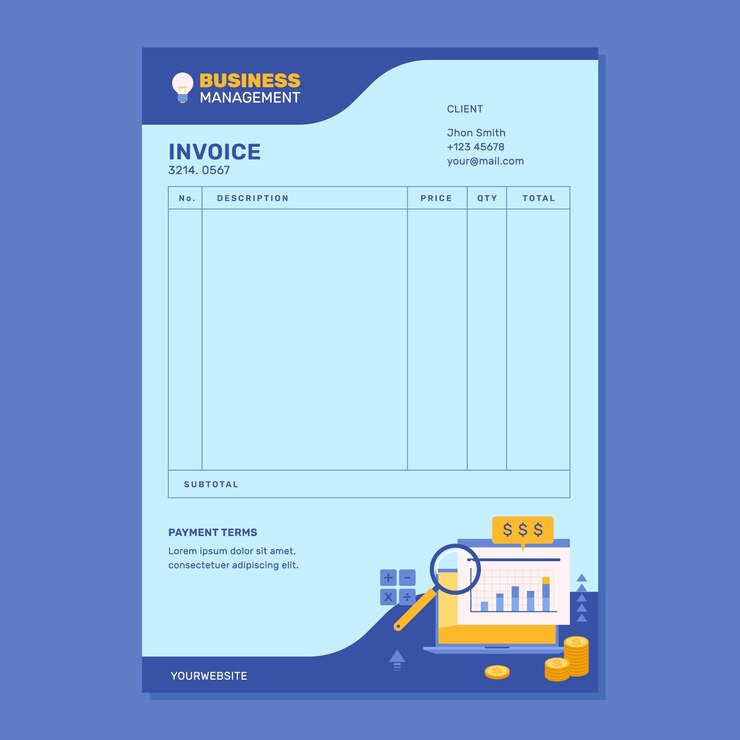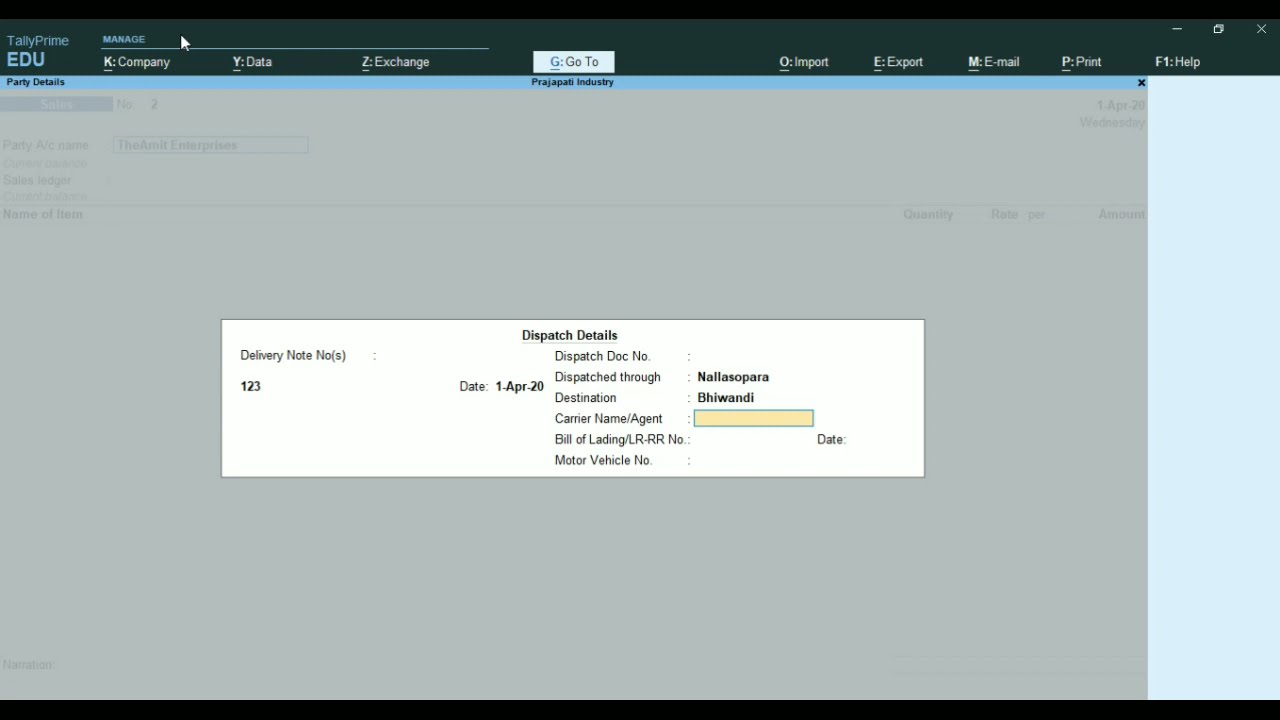Download Brokerage Bill Format for GST Free
- 19 Aug 24
- 13 mins

Download Brokerage Bill Format for GST Free
Key Takeaways
- A brokerage invoice specifically details financial transactions, including shares traded and commission rates, unlike a standard invoice, which is more generalized.
- Customizing your brokerage invoice with your brand's logo, colors, and fonts enhances brand identity and professional appearance.
- Brokerage invoices must adhere to legal and regulatory standards, including clear disclosure of fees and compliance with tax laws.
- Electronic invoicing in brokerage operations promotes efficiency, faster payment cycles, and better regulatory compliance.
- Comprehensive brokerage invoices should include detailed transaction data, fees, client and firm information, and legal disclosures for transparency.
Brokerage invoice templates serve a crucial role in the world of finance and real estate, helping brokers efficiently manage transactions and bill clients. This article delves into the various types of brokerage invoices, their necessary features, and why certain formats are preferred over others.
By knowing these templates, broker business can utilise billing invoice format and ensure compliance, accuracy, and professionalism in their billing processes.
What are the different types of invoices?
When dealing with brokerage services, selecting the right type of invoice is crucial for clear communication and efficient financial transactions. Here are common types of invoices that are particularly relevant in various industries, including accessible brokerage firms:

- Standard Invoice: This is the fundamental type used across all industries, including brokerage. It details the services provided, the accurate costs associated with them, payment terms, and the total amount due. For brokerage, it might include details like transaction fees, commission rates, and other service charges.
- Proforma Invoice: While not a true invoice, this is used in brokerage to provide an estimate of the charges likely to be incurred in a transaction. This can be useful for clients to arrange for funds or for internal approvals before a transaction is finalized.
- Commercial Invoice: Important for brokerage firms dealing in international trading of goods or securities, this invoice is used for customs and tax purposes. It details the value and description of the traded goods or services and is used in the calculation of tariffs and international shipping.
- Credit Invoice: Also known as a credit memo, this is issued when there needs to be a reduction in the amount billed due to a previous overcharge or when refunds are issued to the client for various reasons, such as transaction errors.
- Debit Invoice: Issued when additional charges are incurred beyond what was initially billed or estimated. In brokerage, this could occur due to unforeseen expenses or changes in transaction fees.
- Commission Invoice: Specific to services where payment is based on commission, such as real estate or stock brokerage. This invoice details the commission percentage, the base amount the commission is calculated from, and the total commission earned.
- Service Invoice: Used when charging for purely service-based activities, which in the context of brokerage, might include advisory fees, management fees, or charges for handling special transactions.
- Recurring Invoice: Useful for brokerage firms that charge regular fees, such as monthly advisory fees, portfolio management fees, or any other ongoing service fees.
- Consolidated Invoice: This combines several charges into one bill and is useful in brokerage when a client has multiple accounts or has engaged in numerous transactions that need to be billed together.
- Progress Invoice: Not typically used in standard brokerage services but can be relevant in project-based financial advisory services, where the invoice is issued periodically as work progresses.
Each type of invoice serves a specific purpose and helps ensure that financial records are clear, transactions are transparent, and both the brokerage firm and the clients understand the charges incurred and the services provided.
What is a Brokerage Bill Format?
A brokerage bill format is a specific type of invoice that brokerage firms use to bill clients for financial transactions involving the trading of stocks, bonds, commodities, or other financial services. This type of bill is critical to ensuring transparency and detailing all charges incurred during trading or brokerage services. Here are some key elements typically included in a brokerage bill format:
- Customer Details: Full name, contact information, and address of the client to ensure the bill is correctly addressed.
- Company Details: Name, contact information, and address of the brokerage firm, along with any pertinent company identification numbers (like tax IDs).
- Transaction Details: Detailed information about each transaction, including date, type of transaction (buy, sell, trade), quantity of shares or units, and price per unit.
- Item Details: Description of the securities or services provided.
- Commission and Fees: A detailed breakdown of all charges, including commission rates, service fees, transaction fees, and any other applicable charges.
- Bank Details: Information for making payments, such as bank account numbers or other payment processing details.
- Tax Details: applicable tax rates and calculations, including GST, if applicable, with proper HSN or SAC codes.
- Total Amount Due: A clearly stated total cost that the client has incurred, taking into account all services, taxes, and fees.
- Payment Terms: Due date for payment and accepted methods of payment (e.g., bank transfer, check, online payment).
- Digital Signature: A digital signature of the authorized personnel from the brokerage firm to validate the bill.
- Essential Document Indicators: Reference numbers, invoice or bill numbers, and other relevant tracking information for accounting or legal use.
This format ensures that all necessary details are communicated between the brokerage firm and its clients, aiding in the management of financial records and compliance with legal and tax obligations.
Why Do You Need a Brokerage Bill Format?
A brokerage bill format generator is essential for several key reasons, especially in ensuring that transactions are documented professionally and in compliance with legal and tax regulations. Here’s why having a specific invoice format is crucial for brokerage services:
- Compliance with Legal Requirements: Many jurisdictions require specific information on invoices for legal and tax purposes. A brokerage bill format tailored to meet these requirements ensures compliance with financial regulations, such as those involving the disclosure of transaction details and brokerage fees.
- Accurate Record-Keeping: Professional invoices help in maintaining accurate and detailed records of all transactions. This is crucial not only for financial accounting but also for auditing purposes. A proper format helps ensure that all necessary data is consistently recorded.
- Clarity and Transparency: A well-structured invoice format provides clear and detailed information about each transaction, including commissions, fees, and applicable taxes (such as GST). This transparency helps build trust with clients, as they can easily understand what they are being charged for and why.
- Efficient Tax Filing and Returns: Detailed invoices facilitate the correct filing of tax returns by ensuring that all taxable transactions are accurately recorded. This is particularly important for brokerage firms that must handle complex transactions involving various tax rates and regulations.
- Professionalism: A standardized, professional-looking invoice reflects well on the brokerage firm, enhancing its reputation. It also aids in ensuring that clients treat invoices seriously and with the respect they merit.
- Facilitates Quick Payments: An organized and clear invoice format can help speed up the payment process. Clients are more likely to process payments without delay when they receive well-documented and easy-to-understand invoices.
- Customization and Flexibility: Having a customizable invoice format allows brokerage firms to adapt their invoices to the specific needs of different transactions or clients. This can include varying levels of detail, different structures of fees and commissions, or additional information relevant to specific trades.
- Integration with Accounting Software: A consistent invoice format can be easily integrated with accounting and billing software, automating much of the invoicing process and reducing the chances of errors. This integration is essential for efficiency in larger firms dealing with numerous transactions daily.
What are the Various Types of Brokerages?

Brokerages operate in various sectors with different functionalities, tailored to meet specific investor needs and business models. Knowing these types can help in selecting the right brokerage for particular investment strategies or business requirements.
Here are the primary types of brokerages:
- Full-Service Brokerage: These brokerages provide a comprehensive range of services, including investment advice, research, retirement planning, tax tips, and access to financial advisors. They typically charge higher fees and commissions. They are suitable for investors who prefer a hands-on approach to managing their investments.
- Discount Brokerage: Discount brokers offer fewer services but at a lower original cost. They allow clients to buy and sell securities without providing investment advice. This model is well-suited for more experienced investors who prefer a do-it-yourself approach to investing.
- Online Brokerage: An evolution of the discount model, online brokerages provide platforms where investors can manage their portfolios via the internet. They offer low commission rates and user-friendly interfaces. Such platforms may also provide educational tools to help users make informed investment decisions.
- Robo-Advisor: These are automated platforms that provide financial planning services with minimal human intervention. They use algorithms to manage and allocate a client’s assets based on risk preferences and goals. Robo-advisors are known for their low fees and are ideal for passive investors.
- Real Estate Brokerage: Specializing in real estate transactions, these firms assist clients in buying, selling, and renting properties. They provide market analysis, property listings, negotiation expertise, and handle the legalities of real estate transactions.
- Insurance Brokerage: Insurance brokers act as intermediaries between clients and insurance companies, helping to find the best insurance policy for the client’s needs. They may deal in various types of insurance, such as life, health, and property.
- Commodity Brokerage: These firms specialize in trading commodities like oil, metals, and agricultural products. They may provide services similar to full-service brokerages but are focused on the commodity markets.
- Forex Brokerage: Specializing in currency trading, forex brokers provide platforms for trading different currencies against each other. They cater to a range of clients, from retail to institutional traders.
- Crypto Brokerage: These are specialized platforms that facilitate the buying and selling of cryptocurrencies. Some offer a simple platform for transactions, while others provide additional services like wallets and crypto-based financial products.
Features that Make Pice Best for Creating Brokerage Bills

The software "Pice" can be highly effective for creating brokerage bills due to several integrated features that cater to the specific needs of brokerage services.
Here’s how Pice may stand out as an optimal solution for generating accurate and professional brokerage invoices:
- Customizable Templates: Pice allows users to customize invoice templates to include all necessary brokerage-specific fields such as commission payments, transaction details, HSN/SAC codes for GST compliance, and more. This flexibility ensures that the invoices can be tailored to meet the specific requirements of different brokerage transactions.
- GST Compliance: For brokerages operating in regions where GST is applicable, Pice supports the inclusion of GST details in invoices, which is crucial for tax filing. It automatically calculates GST based on the services provided, ensuring accuracy and compliance with tax laws.
- Automated Calculations: Pice can automate the calculation of commissions, taxes, and total amounts due, reducing the possibility of human error and ensuring that the invoices are accurate and trustworthy.
- Digital Signature Integration: To add a layer of authenticity and legality, Pice supports digital signatures on invoices, which is particularly important for official documents in financial transactions.
- Easy Sharing and Storage: Invoices created with Pice can be easily shared via email or other digital means directly from the platform. Additionally, Pice offers cloud storage options, making it easy to store, retrieve, and organize invoices without the need for physical files.
- Comprehensive Contact and Banking Details: It supports the detailed inclusion of contact and bank account details, which is crucial for ensuring payments are made correctly and on time.
- Professional Appearance: Pice ensures that each invoice generated has a professional look, which enhances the credibility of the brokerage firm. This is important for maintaining a strong professional image with clients.
- Mobile and Desktop Compatibility: For brokerages that need access on the go, Pice is accessible on both mobile devices and desktops, which enhances flexibility and accessibility for users who travel frequently or split their time between the office and other locations.
- Multi-Currency Support: For brokerages dealing with international transactions, Pice supports invoicing in multiple currencies, which is essential for accurately documenting transactions in the client’s preferred currency.
- Integrated Accounting Features: Pice often includes features that integrate with broader accounting tools, simplifying the financial management process by ensuring all transactions are recorded directly in the firm’s accounting software.
By integrating these features, Pice ensures that brokerage firms can create detailed, accurate, and compliant invoices with ease, enhancing overall efficiency and client satisfaction.
Conclusion
The software "Pice" offers a robust set of features tailored specifically for brokerage firms that need efficient, accurate, and professional invoicing solutions. With capabilities such as customizable templates, automated tax and commission calculations, and GST compliance, Pice ensures that every invoice meets the highest standards of accuracy and legality.
The integration of digital signatures and easy sharing options enhance the professionalism and security of transactions. Additionally, its compatibility with multiple devices and support for various currencies make Pice an adaptable choice for global business environments. By streamlining the invoicing process,
Pice not only simplifies the administrative workload but also supports better client relationships and compliance with financial regulations, positioning it as an essential tool for modern brokerage services.
💡Tired of searching bill formats? Get started with PICE today and create accurate brokerage bill format for GST.




















